It’s quite difficult to understand which lens for Sony A5100 would be the best for your purposes. You have to know some abbreviations and features to choose it but manufacturers tend to use different abbreviations for similar things. I have created a guide with useful tips that will help you figure out all the necessary aspects and find a good lens for Sony A5100.
If you have just bought your first camera with an interchangeable lens, you are probably already looking for a new lens to add to your collection. That’s the right decision as no matter how advanced your camera is, it won’t show the full potential without high-quality lenses.
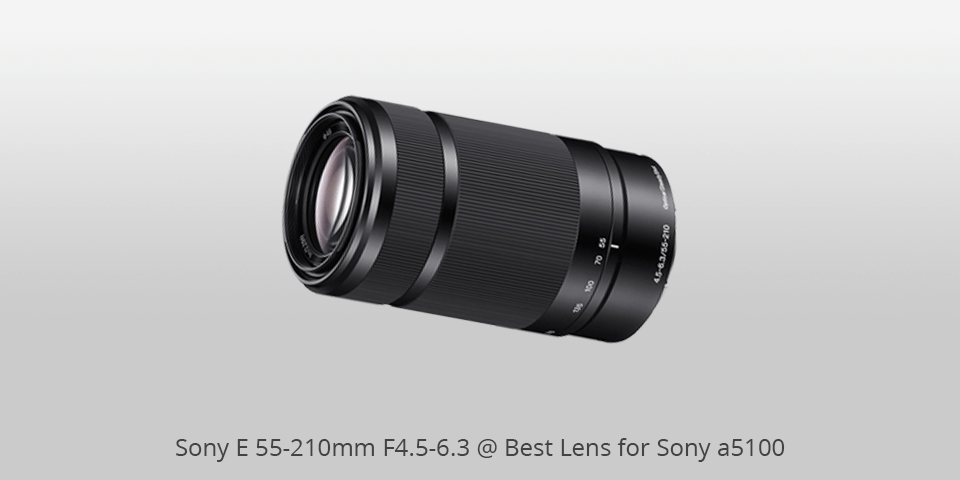
Mount: E | Diaphragm blades: 7 | Autofocus: good | Min focus distance: 1.0 m | Max magnification: 0.215x | Filter thread: 49 mm | Dimensions (WxL): 210 mm | Weight: 0.76 lbs
⊕ Lightweight and portable
⊕ Telephoto reach
⊕ Optical stabilization system
⊖ Expensive
This Sony A5100 wide angle lens is suitable for shooting sports events or nature. It has a great focus that provides seamless and silent performance, which is convenient if you are planning to record videos. This is a top-quality lens, which offers Optical SteadyShot image stabilization for taking stunning photos outdoors. Match the white index on your lens with the white index on your camera (also called mounting index), insert the lens in the camera and turn it clockwise until you hear a locking sound.
This is lens is portable and lightweight, which is why it’s very convenient to work with. Due to inbuilt Optical SteadyShot image stabilization, you will achieve sharp photos even when taking them in poor lighting.
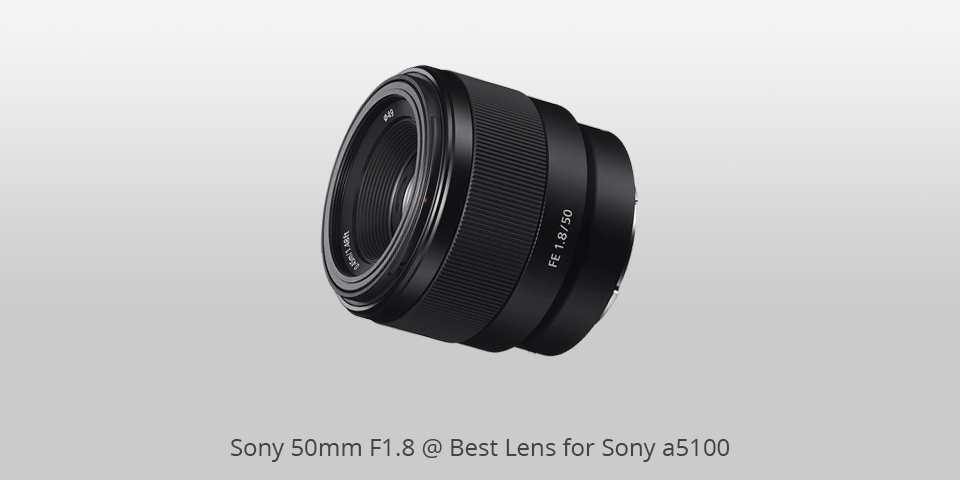
Mount: FE | Diaphragm blades: 7 | Autofocus: good | Min focus distance: 0.45m | Max magnification: 0.14x | Filter thread: 49mm | Dimensions (WxL): 50 mm | Weight: 0.65 lbs
⊕ Great quality of the image
⊕ Cheap
⊖ The focusing speed isn’t high
This is one of the best lenses for Sony A5100. It’s a 50mm full-frame lens with a focal length suitable for shooting portraits as well as different subjects.
It boasts a bright f/1.8 max aperture with 7 blades and an aspherical element, which guarantees the amazing quality of the image and gorgeous background bokeh effect. This lens is small and lightweight. Its minimum focus distance is 0.45m (1.48 ft).
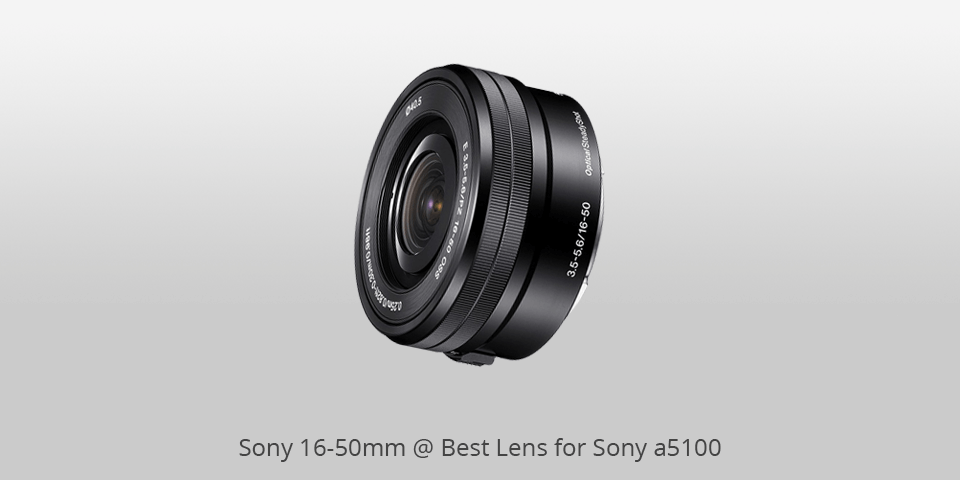
Mount: E | Diaphragm blades: 7 | Autofocus: good | Min focus distance: 0.3m | Max magnification: 0.215x | Filter thread: 40 mm | Dimensions (WxL): 50 mm | Weight: 4.09 ounces
⊕ Lightweight and portable
⊕ Fast and almost silent autofocus
⊕ Stabilized optics
⊖ Zoom motor can be heard
This lens for Sony A5100 is extremely small and lightweight. While it can’t be compared with more expensive options when it comes to performance and functionality, it works well for beginners.
However, you have to purchase it together with a camera as it brings the actual cost down to around $100.
This lens has a smooth and quiet zoom, ED glass and aspherical lens elements, which provide great performance and control aberrations. Due to its size (it can retract to 29.9 mm) and weight, it’s very convenient to carry on the go. The E PZ 16-50mm is the smallest zoom that Sony lenses ever had. It increases the depth of the camera body by just 1.2 inches when it’s collapsed.
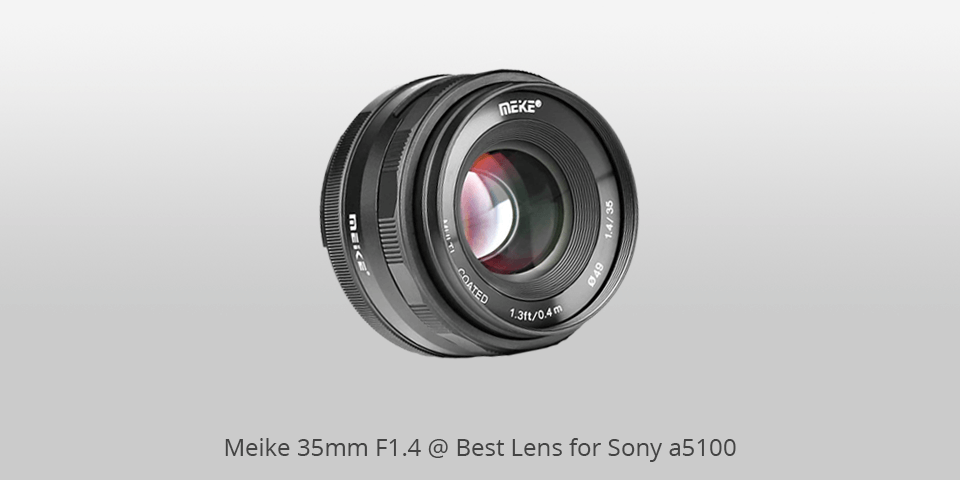
Mount: E | Diaphragm blades: 9 | Autofocus: good | Min focus distance: 0.4m | Max magnification: 0.113x | Filter thread: 49mm | Dimensions (WxL): 35 mm | Weight: g
⊕ Great background blur
⊕ Decent color rendition
⊖ Heavy chromatic aberrations
This model features a large aperture of f/1.4-16 and high light density, which lets you shoot even in the worst lighting conditions. This is a multi-layered Sony A5100 wide angle lens with a durable metal body. You can easily adjust it to your comfort.
This lens is ideal for shooting landscapes, products and portraits. Besides the A5100, you can use it with any E-mount camera from Sony, including Sony A9, A7RIII, NEX 3, etc. Its APS-C Visual angles are diagonal 43°, horizontal 37° and vertical 25°. It consists of 8 elements across 5 groups.
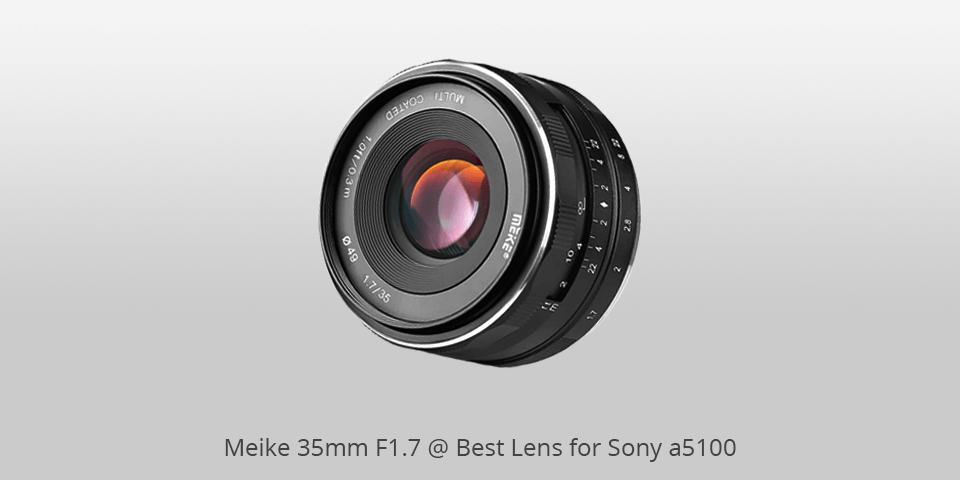
Mount: E | Diaphragm blades: 7 | Autofocus: good | Min focus distance: 30 cm | Max magnification: 0.11x | Filter thread: 49 mm | Dimensions (WxL): 35 mm | Weight: 6.40 ounces
⊕ Affordable
⊕ Small
⊕ Great build quality
⊖ Lack of a click aperture ring
You can use this type of lens for product, urban, landscape and portrait photography. It features an f/1.7 max aperture, due to which you can take photos at night or in dark places. Its min aperture is f/22, and the diameter of the filter is 49mm. To use this manual lens, you have to switch the “M mode” or “Release without lens” in the camera settings.
It’s a multi-coated lens and has such angles: diagonal 44° 20', horizontal 36° 30' and vertical 23°. You can use it with E-mount mirrorless Sony cameras, including A7III, A9, NEX 3, 3N5, NEX 5T, A5100, etc. Before purchasing it, make sure it’s suitable for your camera.
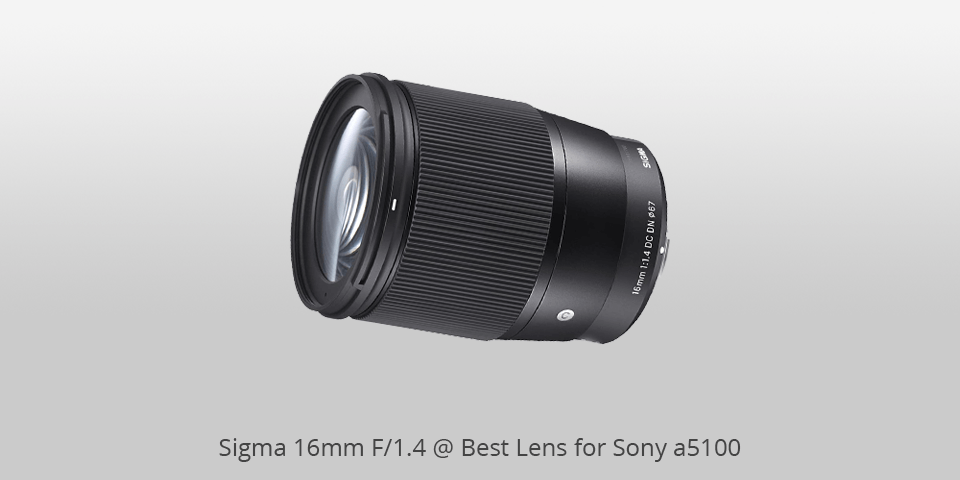
Mount: E | Diaphragm blades: 9| Autofocus: good | Min focus distance: 25 cm | Max magnification: 0.1× | Filter thread: 67mm | Dimensions (WxL): 16 mm | Weight: 0.89 lbs
⊕ Has a bright aperture
⊕ Features wide-angle field of view
⊕ Great illumination
⊖ Barrel distortion is visible
This is one of the best lenses for Sony A5100, which is also suitable for any E-mount camera. You can use it for taking pictures of nature and different events. It boasts a big aperture of f/1.4, which provides amazing performance in poor light conditions. Due to its small size, this model is very portable and can be easily carried with you.
Hybrid AF stepping motor provides smooth autofocus when it comes to recording videos. This lens is dust- and waterproof. It has 16 elements in 13 groups. Its minimum focusing distance is 9.8 inches. The lens measures 3.6x2.8 inches (HD) and weighs 14.3oz. Besides, it has 67mm front filters. It has a typical build of Sigma lenses with a firm metal and polycarbonate body, a big rubber manual focus ring and splash-protection.
| Image | Name | Features | |
|---|---|---|---|
 |
Sony E 55-210mm F4.5-6.3
Our choice |
CHECK PRICE → | |
 |
Sony 50mm F1.8
Compact |
CHECK PRICE → | |
 |
Sony 16-50mm
High quality |
CHECK PRICE → |
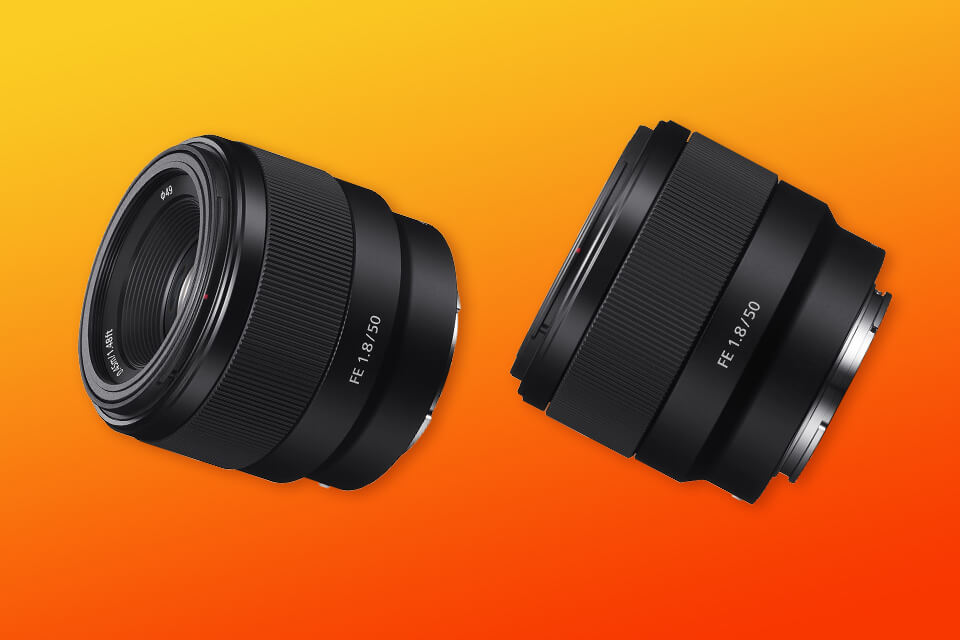
The focal length is very important to pay attention to when selecting the best lenses for Sony A5100. It’s measured in millimeters and defines if it’s a telephoto lens or a wide-angle one.
Each type of lenses has its pros and cons. Telephoto lenses allow you to take photos of subjects from large distances. It’s better to use them if you shoot portraits. With these lenses, you can also easily achieve blurred background as they have a shallow depth of field. Besides, telephoto lenses provide lower brightness and are more blur-prone if you accidentally shake your camera while shooting. Also, such lenses are larger than wide-angle ones.
As for wide-angle lenses, they are suitable for landscape photography. They offer great brightness and the depth of field and are smaller than telephoto lenses. However, this type of lens is not the best for portraits. Such lenses create a large distance between close and distant objects. In this way, it may seem that a person in a photo has larger facial features. Also, such lenses tend to create distortion when straight lines start to bend at the edges of a frame.
There are also models that double as telephoto and wide-angle lenses. They allow you to capture exactly what the human eye sees. While they come in a 135mm format, a normal lens is 50mm. Lenses with smaller focal lengths are wide-angle lenses, and telephoto ones have a longer focal length.
Unlike prime lenses with fixed focal lengths, zoom lenses are the most convenient to work with as they have a wide range of focal lengths. Besides the standard 3x lenses, you can find 7x and 12x ones that are also called “superzooms”. When choosing such lenses, you will see such numbers as 18-200mm or 28-300mm. Remember that zoom and telephoto lenses are completely different. You can also use a wide-angle zoom lens with a focal length shorter than 50mm, such as the Sigma 14-24mm f/2.8.
However, long-range zooms aren’t usually as sharp and bright as prime lenses. Professional zoom lenses are also great, but they provide magnification less than 3x and are quite pricey.
You can find plenty of zoom lenses, with various features and at different prices. If you are looking for a lens to substitute the kit lens you have, for example, a 55-200mm or 70-300mm, a zoom lens is a nice option to choose. Also, the brand doesn’t really matter as there are many models from the less-known companies like Sigma, Tamron and Tokina. They all provide great performance and are not expensive.
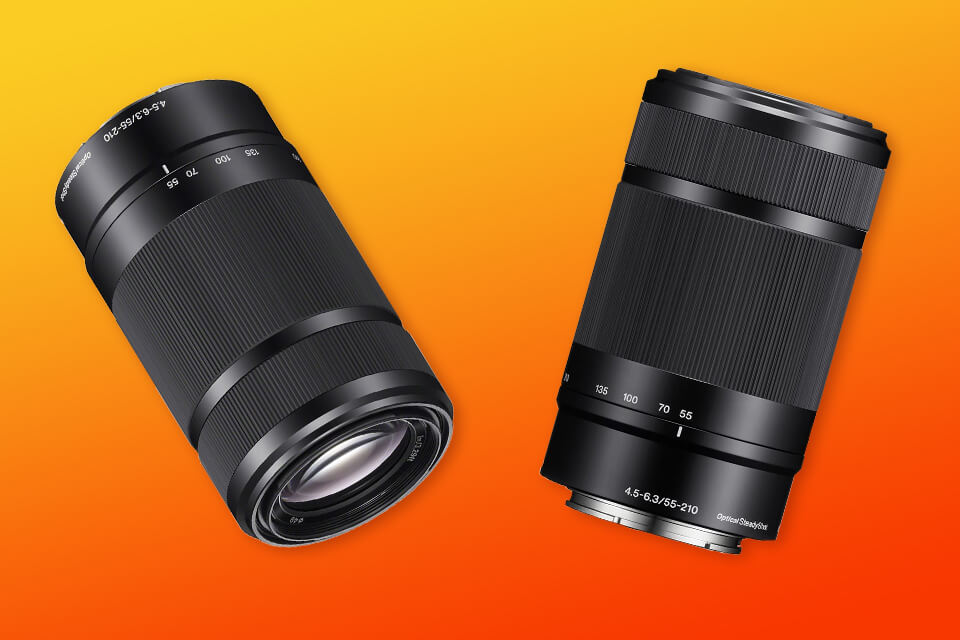
Fixed, or prime, lenses have a stable focal length between 35mm and 50mm. Since you can’t zoom them, these lenses are very easy to use. Also, they provide decent image quality and are affordable in terms of price. A focal length of 35mm allows such lenses to produce realistic images. They are perfect for shooting portraits as they have a wider max aperture. You can achieve better quality than with zoom lenses.
The Sony A5100 is the latest basic camera in the Sony E-mount APS-C series. Due to its 24MP APS-C sensor, 179-point hybrid autofocus and decent features for shooting videos, it can be called the most technologically advanced model for beginners, even though it was released 6 years ago.
If you need a telephoto lens, pick the Sony E 55-210mm f/4.5-6.3 OSS or Sony FE 70-300mm f/4.5-5.6 G OSS. The Rokinon 12mm f/2.0 NCS CS is a great wide-angle lens, while the Sigma 60mm f/2.8 DN and Sony FE 85mm f/1.8 are perfect for shooting portraits. The Sony E 20mm f/2.8 is the best if you are looking for a pancake lens.
Sony released a high-quality and quite pricey FE 90mm f/2.8 Macro G OSS lens. It’s definitely better than Sigma lenses but, in my opinion, Sigma offers more value for the price. The only thing that Sony is better at is a long focal length, which allows you to take photos of faraway subjects.
This camera performs well even in poor light conditions. Its autofocus is still good but it’s definitely not the main strength of this camera. If you are good at taking photos and know how to focus, then this camera if for you.

 Rating
Rating